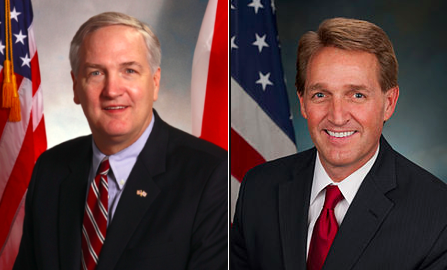With the growing market in the Republican party for Trump’s off-brand conservatism, candidates in races around the country are scrambling to identify themselves in relation to the President. The pressure for candidates to define their platforms less by policy and more by similarity to Trump’s platform has created an interesting political environment—one in which terms like “conservative” and “populism” are thrown together and candidates’ true ideological stances are blurred. It’s no secret that populist rhetoric rose significantly in the GOP in 2016, and that Trump rose with it. The Trump White House and its supporters have put an emphasis on military growth, economic nationalism, and populism. Trump has proposed an increase in military spending, strict immigration policies, and economic policies that benefit America First. Under Trump, the party has shifted to heralding itself as the party of workers, a traditionally populist message.[1]
These are not so-called “establishment” Republican ideals, and yet as President, Trump is the de facto leader of the Republican Party. As such, his powerful endorsement is sought out by candidates in primary elections who want to attract his supporters. Presently, the two main elections of interest are the senatorial run-off in Alabama and upcoming primary Arizona. In both races, there is tension between the establishment, conservatives, and populists. The Alabama race pits former state Attorney General Luther Strange against former state Chief Justice Roy Moore. The two will meet in a run-off on September 26, after a heated first election that had Moore at 39% of the vote and Strange at 33%. Strange managed to procure the President’s endorsement via Twitter, but it’s unclear whether this endorsement will be enough.[2]
The problem is that strange not only has the support of Trump, but also the support of Mitch McConnell and his Super PAC. Due to McConnell’s backing, Strange is seen negatively as the “establishment” candidate in a state that prefers more staunch conservatives. The question remains whether he is an establishment candidate or a Trump candidate- because these are two very different types of voters.[3] Moore has been playing on this confusion, and attempting to distinguish himself from the Washington crowd. The ex-Chief Justice attracts social and religious conservatives, remarking recently that “God’s hand is still on this country, and this campaign.”
Despite Moore’s positive polling, he is a polarizing candidate. Republicans are concerned about what having him as their standard-bearer would mean for the party’s image. There is also the worry that, although AL is a strongly red state, a Democrat might be able to put up a fight against the somewhat controversial Moore.[4] Strange is having an identity crisis. He has the traditional establishment support of McConnell, the support of a non-traditional President, but also a solid conservative record. Some voters seem to believe that who Strange is as a candidate is defined by who supports him—but this shouldn’t necessarily be the case. Strange commented recently, “What distinguishes me from my opponents is I actually have a record of conservative, common-sense accomplishments as opposed to just the rhetoric about ‘I’m a conservative guy, I love President Trump’.”
Strange is probably right- that his conservative record and concrete policy stances should be what matters. But in a confused Republican party that cannot seem to decide if it’s conservative, populist, or something else altogether, his platform may not be what decides the election. In Arizona, the situation is equally as mixed up. Though that race is farther off and still developing, the two candidates currently receiving attention are incumbent Jeff Flake and former state Senator Kelli Ward. Flake is the anti-Trump, traditionally Republican candidate, whereas Ward is the far-right, outlying figure.
Flake has refused to endorse Trump’s White House, and wrote a book on the extreme negative impact he believes Trumpism is having on the GOP. In response, Trump called him out for being “weak on borders” and “weak on crime.” Flake is a by-the-book, Republican conservative, but Trump’s populist narrative does not coincide with his beliefs.
On the other hand, Ward is presenting herself as the Trumpian alternative, although she hasn’t been explicitly endorsed by him. Present polls show her ahead of Flake by as much as 14 points. Ward had a somewhat radical record as a state Senator, including a quasi-libertarian streak in which she supported bills to allow AZ farmers to grow hemp, and to ban red light/speed cameras.
Republicans are worried about Ward, but they are in a pickle. Establishment Republicans have called Ward “a nut” and do not believe she has a legitimate chance of beating a Democratic challenger. Trump Republicans face a dilemma as well—they want Flake out, but they definitely don’t want a Democrat.[5][6]
Trump Republicans are a unique breed. In many cases, they don’t know whether Trump is conservative or populist, though he governs as a conservative. What they do know is that they support Trump, and change in the party. One Trump supporter in Arizona told reporters “I’m on his side with everything. I trust him. I trust all of his decisions. I love all of his policies. He is the man.”
This mindset is a conundrum for Republican politicians, in races like the ones in Alabama and Arizona. Do they identify themselves as conservative or pro-Trump populist? Do they focus on platform or gaining endorsements? The outcomes in Alabama and Arizona might help answer these questions, and provide insight for what’s to come in 2018.
About the Author: Christopher Reid is general practice attorney in Birmingham, Alabama. Mr. Reid worked previously for Republican leadership in the United States House of Representatives in Washington, D.C. He is a frequent co-host for Yellowhammer News radio, a conservative radio show, which is heard throughout the state of Alabama from 12-3 Monday through Friday. Special thanks to Katharine Pickle for her help with this piece.
Sources:
[1]http://www.aljazeera.com/indepth/opinion/2017/02/remaking-republican-party-populism-la-trump-170225120609200.html
[2] https://www.theatlantic.com/politics/archive/2017/08/alabama-election-live-results-primary/536997/
[3] https://www.washingtonpost.com/powerpost/as-polls-open-in-alabama-senate-race-republican-candidates-court-trump-voters/2017/08/15/b535cd58-81b1-11e7-ab27-1a21a8e006ab_story.html?utm_term=.3a3324e8bbc6
[4] https://www.nytimes.com/2017/08/13/us/politics/despite-trumps-support-alabama-senator-struggles-to-a-primary-finish.html?mcubz=3
[5] https://www.usnews.com/news/the-run/articles/2017-08-30/kelli-ward-the-trump-torch-bearer-rattling-arizonas-senate-race
[6] https://www.azpm.org/p/home-articles-news/2017/8/29/115953-big-dollars-and-names-in-play-in-race-for-us-senate-seat-for-arizona/

